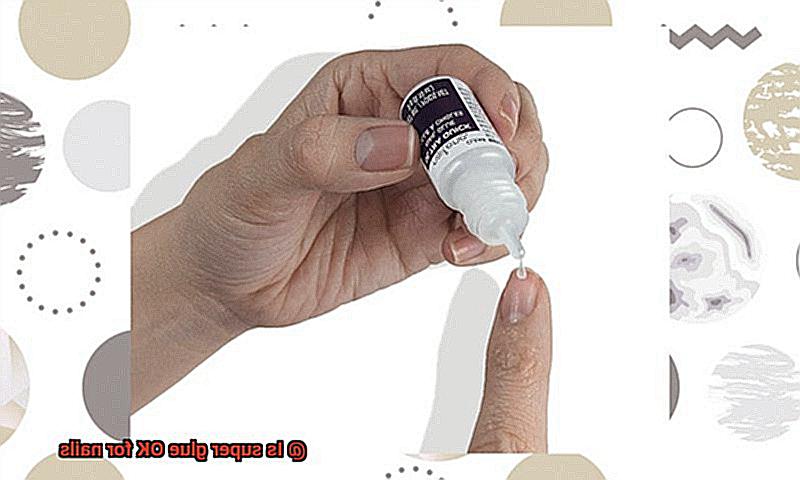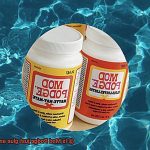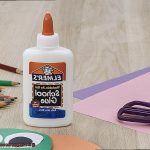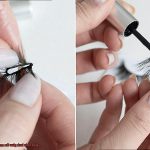Imagine this: you’re getting ready for a big night out when you suddenly spot a cracked or chipped nail. Panic sets in as you scramble to find a solution to save your flawless manicure. In times like these, grabbing that tube of super glue might seem like a quick fix, but is it really safe?
Hey there, fellow nail enthusiasts. Welcome to the captivating world of nail glue exploration. Today, we’re diving deep into the mysterious debate surrounding the use of super glue for nails. We’ll uncover its potential risks, surprising benefits, and share some essential tips for proper application.
While super glue can be a temporary lifesaver for fixing a broken nail, it’s important to understand both its potential dangers and how to use it correctly. So let’s embark on this adhesive journey together.
Is super glue OK for nails?
Contents
- 1 Is super glue OK for nails?
- 2 What is Super Glue?
- 3 Potential Risks of Using Super Glue on Nails
- 4 Benefits of Using Super Glue on Nails
- 5 Alternatives to Super Glue for Nail Repairs
- 6 Tips on How to Use Super Glue Safely on Nails
- 7 Common Mistakes People Make When Using Super Glue on Nails
- 8 How Long Does Super Glue Last on Nails?
- 9 Professional Advice for Maintaining Healthy Nails
- 10 Conclusion
Benefits of Super Glue for Nails:
When used properly, super glue can work wonders for your precious manicure. Its strong adhesive properties can effectively repair minor nail mishaps, preventing further damage and allowing you to proudly show off those fabulous fingertips without worry.
What’s more, using super glue on nails might save you from rushing to the salon or having to redo your entire manicure. It’s a convenient and cost-effective solution that appeals to those who prefer quick fixes in a pinch.
Risks and Proper Application:
However, while super glue offers advantages, it’s crucial to be aware of the potential risks. Many types of super glue contain harsh chemicals that could irritate your skin or trigger allergic reactions. Everyone’s sensitivity is different, so it’s wise to do a patch test before going all-in.
To ensure safe application, follow these essential steps. Start by making sure your nails are clean and dry—no polish or oils allowed. Use a toothpick or tiny brush (precision is key.) to apply a small dot of super glue to the broken nail. Gently press the edges together and hold for a few seconds.
Remember, a little goes a long way, so avoid going overboard with the glue.
In the realm of nail emergencies, super glue can be your shining hero or a sneaky villain. While it may provide temporary fixes for your nail troubles, it’s important to proceed with caution and follow proper application guidelines.
Sensitivity to the chemicals in super glue varies from person to person, so always listen to your body and discontinue use if
What is Super Glue?
Prepare to be amazed by the incredible world of super glue, also known as cyanoacrylate adhesive. This remarkable adhesive has revolutionized the way we repair and bond materials, earning its place as a household staple and an essential tool across various industries.
In this article, we will embark on a journey to explore the composition, working mechanism, unique characteristics, and wide-ranging applications of super glue.
Composition and Working Mechanism:
At the heart of super glue lies cyanoacrylate, a clear liquid that possesses astounding bonding properties. When exposed to even the slightest hint of moisture, cyanoacrylate molecules spring into action, undergoing rapid polymerization.
This chemical reaction creates powerful bonds between surfaces, resulting in a secure and durable connection. It is this mechanism that allows super glue to work its magic in record time.
Fast-Acting Bonding:
Time is of the essence when it comes to repairs, and super glue delivers with lightning-fast bonding capabilities. Within mere seconds or minutes, depending on factors such as formulation and environmental conditions, this adhesive sets, creating an instant bond that defies expectations.
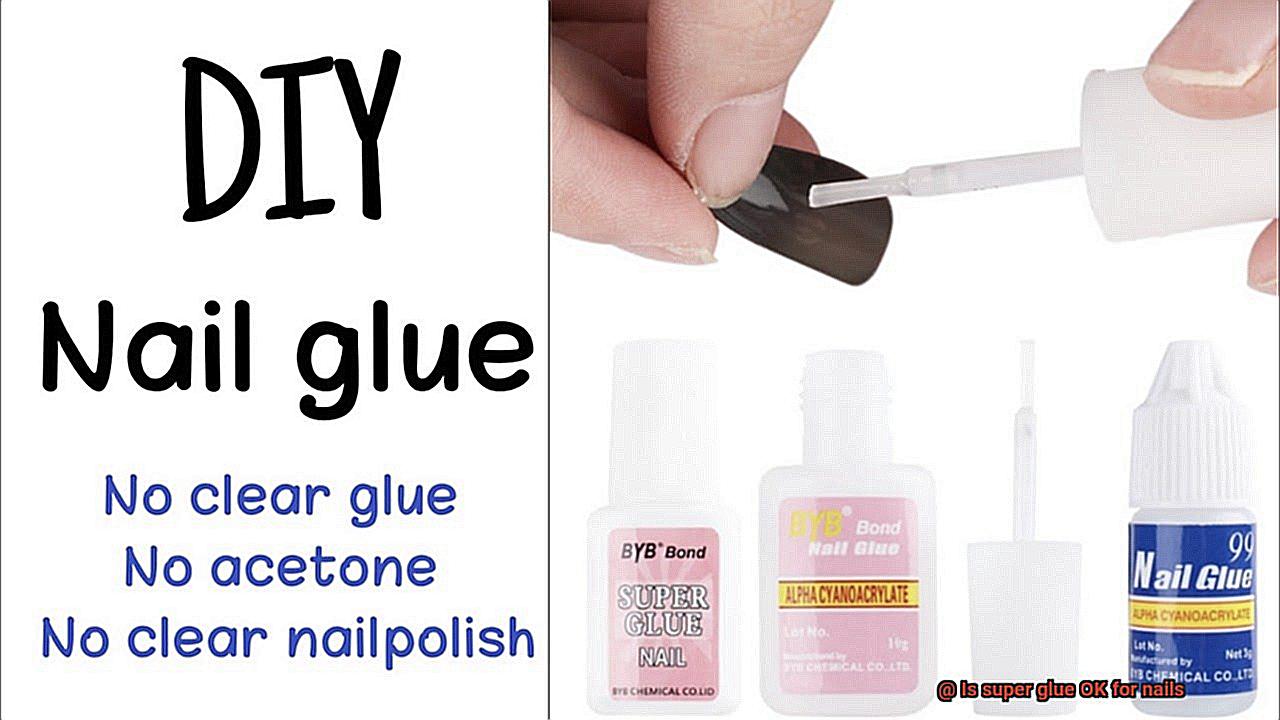
Whether it’s fixing a broken heirloom or reattaching a delicate figurine, super glue is a reliable companion for urgent repairs.
Exceptional Strength and Durability:
Once cured, super glue showcases its true strength and resilience. It forms an incredibly strong bond that can withstand not only the test of time but also heat, water, and most chemicals. Its versatility shines through as it successfully bonds materials ranging from ceramics and plastics to metals and wood. No matter the project or task at hand, super glue rises to the challenge.

Unique Characteristics:
Super glue possesses several distinctive characteristics that set it apart from other adhesives. For starters, it dries clear without leaving any visible residue behind, ensuring a seamless and aesthetically pleasing finish. Furthermore, when stored correctly – in a cool, dry place with a tightly sealed cap – super glue boasts an impressive shelf life, allowing users to have it readily available whenever needed.
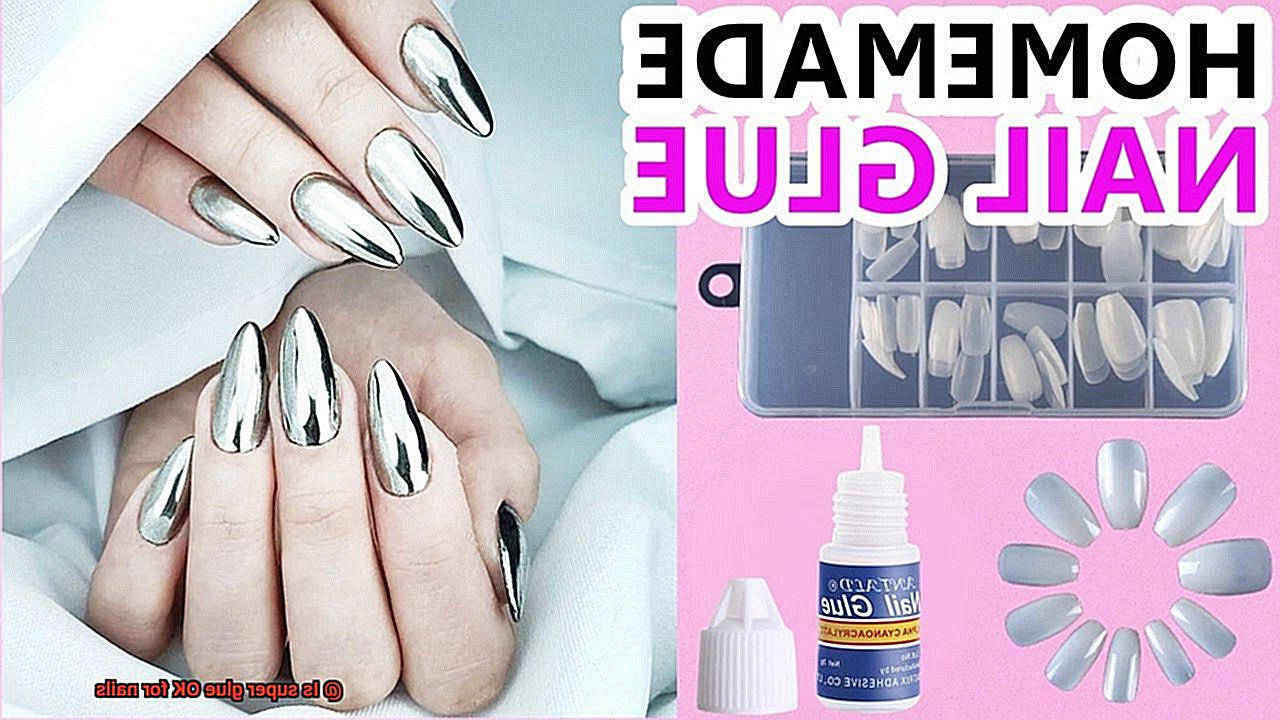
Applications:
The applications for super glue are as diverse as the materials it can bond. Here are just a few of its popular uses:
- Household Repairs: Fixing broken ceramics, glassware, or household items.
- DIY Projects: Bonding craft materials, model building, or jewelry making.
- Automotive Repairs: Securing loose trim, fixing small parts, or bonding plastic components.
- Electronics: Repairing damaged cables, securing loose connections, or gluing small components.
- Medical Applications: Closing minor cuts and wounds under medical supervision.
Safety Precautions:
While super glue is a versatile adhesive, it is crucial to prioritize safety during use. Here are some essential tips:
- Use super glue in well-ventilated areas to minimize exposure to fumes.
- Avoid direct contact with skin and eyes; seek immediate medical attention if accidental contact occurs.
- Keep super glue out of reach of children and pets.
- Always follow the manufacturer’s instructions for proper usage.
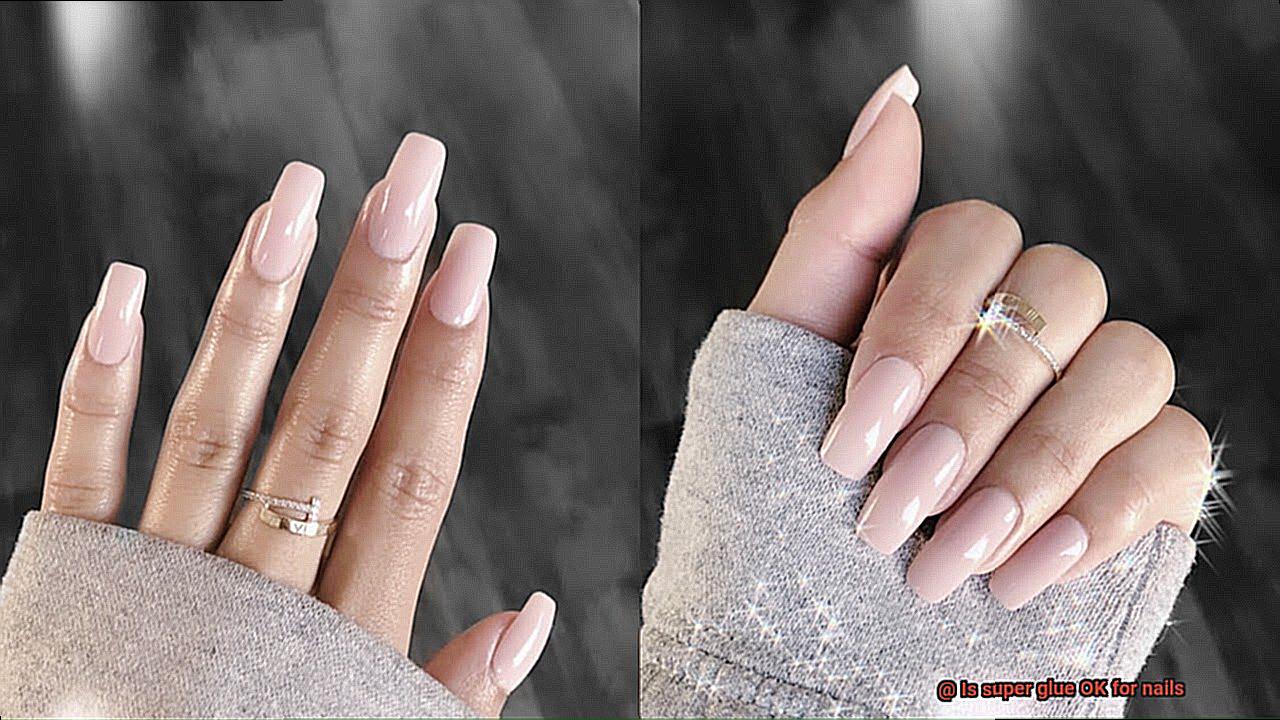
Potential Risks of Using Super Glue on Nails
We all love a bit of DIY magic, but when it comes to our precious nails, caution is key. Today, we unveil the lurking dangers of using super glue on your nails. Yes, that’s right – the same super glue that rescues your broken coffee mug or fixes your child’s shattered toy. But trust us, the combination of super glue and nails is a recipe for disaster.
Skin Irritation and Allergic Reactions:
Prepare for a battle with irritated skin. Super glue contains chemicals that wage war against your delicate skin. For those with sensitive skin or allergies, applying super glue to your nail bed can lead to an unwelcome army of redness, itching, and even dermatitis. Ouch. Your fingers deserve better.
Damage to the Nail Plate:
Super glue is a formidable adhesive that turns your nail into a hardened battleground. A disaster waiting to strike, this rigid layer prevents your nail from flexing naturally. The result? Brittle, fragile nails susceptible to breakage and detachment. Removing the glue improperly only adds fuel to the fire, causing further damage to your precious nail bed.
Interference with Proper Nail Growth:
Nails thrive on oxygen and moisture for their survival. Alas, using super glue on your nails sabotages their growth journey. That hardened layer acts as an impenetrable fortress, blocking the exchange of oxygen and moisture between your nail bed and the world around it. The price? Weak, discolored, and peeling nails – definitely not the fabulous look we strive for.
Risk of Infection:
Prepare for an invasion of unwanted guests. Applying super glue to open wounds or cuts near your nail area creates a cozy hideout for bacteria and other pesky pathogens. This sets the stage for infections like paronychia – a painful condition characterized by redness, swelling, and pus formation. Trust us, it’s an experience you’d rather avoid.
Chemical Exposure:
- Here’s a chilling fact: super glue isn’t designed for cosmetic use on nails. Some glues harbor harmful chemicals that should never come into contact with your precious skin or be inhaled. Yikes. Inhaling toxic fumes or prolonged exposure to your skin can have severe health consequences. Don’t let this be your battle.
- The bottom line is simple: super glue and nail care are not comrades. Instead, entrust your nails to the expertise of a professional nail technician or utilize products specially crafted for nurturing your nails. Your nails will thank you for it.
Benefits of Using Super Glue on Nails
In the ever-evolving world of nail care, there’s always something new to try. One method that’s been gaining traction among nail enthusiasts is using super glue on nails. Yes, you read that right. Super glue isn’t just for fixing broken items anymore – it can take your nail game to the next level. In this article, we’ll explore the benefits of using super glue on nails and how it can revolutionize your manicures.
Quick and Strong Bond:
Bid farewell to waiting around for your nail glue to dry and set. Super glue offers a lightning-fast solution that creates an unbreakable bond between your nails and the nail bed. Within mere seconds, your nails will be securely in place, making it perfect for those rushed moments or emergency fixes.
Long-lasting Results:
Are you tired of your beautiful manicures chipping or lifting prematurely? Enter super glue – your savior. With its exceptional durability and long-lasting adhesive properties, your manicures can now withstand the test of time. No more frequent touch-ups or repairs needed; your nails will stay flawless for an extended period.
Versatility:
Super glue isn’t just a one-trick pony; it’s a versatile tool that caters to all your nail-related needs. From fixing a broken nail to getting creative with intricate nail art designs, super glue’s strong adhesive properties ensure that everything stays perfectly in place. Let your imagination run wild with endless possibilities.
Cost-effective Option:
We all appreciate budget-friendly options. Compared to traditional nail glues specifically formulated for nails, super glue tends to be more cost-effective. It’s widely available at affordable prices, allowing you to get more bang for your buck. Save those extra dollars without compromising on quality or performance.
Widely Accessible:
Say goodbye to the hassle of searching for specialized beauty supply stores or salons. Super glue is easily accessible and can be found in most hardware stores, pharmacies, and supermarkets. Its portable packaging makes it convenient to carry with you wherever you go, ensuring that you’re always prepared for nail emergencies.
Alternatives to Super Glue for Nail Repairs
There are alternatives aplenty to the mighty super glue for your nail repair needs. Let me take you on a journey through the realm of nail repairs and explore these wondrous alternatives in detail.
First up, we have the formidable nail glue. This specially formulated adhesive is a safer alternative to super glue, specifically designed for nail repairs. It bonds artificial nails to natural nails and can also work its magic on minor repairs. With its quick-drying nature and strong bond, nail glue ensures your nails stay intact without causing any damage.
Next, behold the versatile nail adhesives, available in various forms such as adhesive tabs or strips. These gems are a breeze to apply and remove, making them ideal for temporary nail repairs. Whether it’s fixing broken nails, securing artificial nails, or flaunting your fabulous nail art designs, these adhesive wonders have got you covered.
For those in need of more extensive nail repairs, fear not. Silk wraps and fiberglass come to the rescue. These resilient materials provide much-needed support and strength when applied over the damaged area of the nail. Paired with a special resin or adhesive, they bond seamlessly to your nails, fortifying them against further breakage.
Yearning for a long-lasting solution? Look no further than gel overlays. Picture this: a luscious layer of gel polish or gel resin delicately applied over your natural nail or damaged area. Under the gentle embrace of a UV or LED lamp, this masterpiece cures into a robust finish that shields and strengthens your precious nails.
Enter the world of acrylic powder and liquid, where alchemy takes place. When these two mystical elements combine, they form a paste-like substance that can be artfully spread over the damaged nail. Witness the transformation as this magical mixture hardens into a sturdy layer, offering both repair and protection.
Yet, behold the ultimate saviors for severely damaged natural nails – nail wraps or tips. These artificial nails come to your rescue, attaching themselves to your natural nails with the grace of a skilled artisan. They provide the length and strength you seek, while seamlessly blending in with your own nails until they grow out.
Tips on How to Use Super Glue Safely on Nails
Super glue can come to the rescue in these situations, but it’s crucial to use it safely to avoid any potential harm or damage. In this article, we will share some helpful tips on how to use super glue safely on your nails, ensuring both effectiveness and protection.
Prepare Your Nails
The foundation of a successful super glue application starts with clean nails. Before applying the glue, make sure your nails are free from any oils, lotions, or nail polish. Gently clean them with acetone or a nail polish remover to ensure better adhesion. This step ensures that the glue bonds securely to the nail surface.
Use a Protective Barrier
To shield your skin from the powerful adhesive properties of super glue, apply a thin layer of petroleum jelly or cuticle oil around the skin surrounding your nails. This acts as a protective barrier, preventing the glue from sticking to your skin and causing irritation or discomfort.
Apply a Small Amount
When it comes to super glue, less is more. Using only a small amount is key to a successful application. A tiny drop or two is usually enough to bond the broken or split nail back together. Applying too much glue can lead to clumping or excessive buildup, making it difficult to remove later.
Precise Application
Precision is vital when applying super glue to your nails. To ensure accurate placement, use a toothpick or an orangewood stick to carefully place a small drop onto the nail surface. By avoiding contact with your cuticles or skin, you prevent unnecessary mess and potential skin irritation.
Press Firmly but Gently
After applying the super glue, press your nails together firmly for a few seconds to ensure proper bonding. This step helps the glue establish a strong adhesive bond. However, it’s important to exercise caution and not apply too much pressure, as this can cause discomfort or damage to the delicate nail bed.
Trim Excess Glue
Once the glue has dried and bonded your nails together, it’s time to trim off any excess glue. Using a nail file or buffer, gently remove any visible excess glue. This step not only helps achieve a smooth and even surface but also reduces the risk of accidental snags or tears that could compromise the repaired nail.
Common Mistakes People Make When Using Super Glue on Nails
Super glue can be a valuable tool for fixing broken nails or creating stunning nail art designs. However, achieving perfect results requires attention to detail and proper technique. In this article, we will explore the most common mistakes people make when using super glue on nails and provide tips on how to avoid them.
Applying Too Much Glue:
Super glue is known for its strong adhesive properties, so a little goes a long way. Applying too much glue can result in a messy and uneven application, making it difficult to achieve a natural-looking result. To prevent excess messiness, use a minimal amount of glue.
Neglecting Nail Preparation:
Properly preparing your nails is essential before applying super glue. Thoroughly clean your nails and remove any old polish or oils. This step ensures better adhesion and a longer-lasting bond. Skipping nail preparation may cause the glue to not stick properly or peel off easily.
Using Super Glue as a Nail Repair Solution:
Although tempting, using super glue as a quick fix for broken or damaged nails is not recommended. Super glue is not designed for nail repairs and can actually cause further damage. Consult a professional for proper nail repairs or use specialized nail adhesives formulated for this purpose.
Forgetting Protective Measures:
Super glue can be sticky and challenging to remove if it comes into contact with your skin or surrounding areas. To prevent accidental contact, wear protective gloves or apply a barrier cream around your nails before applying super glue.
Rushing the Drying Process:
Patience is key when using super glue on nails. It requires sufficient time to fully dry and set, typically around 24 hours. Trying to speed up the process by using heat or blowing on your nails can compromise the bond and result in lifting or chipping of the glue. Allow adequate time for the glue to dry properly.
Using Super Glue as a Substitute:
Resist the temptation to use super glue as a substitute for nail glue or adhesive tabs. Super glue is not specifically formulated for use on nails and may lack the flexibility and durability required for long-lasting results. Always use products specifically designed for nail applications.
How Long Does Super Glue Last on Nails?
Tired of incessantly fixing broken nails or struggling with artificial nails that won’t stay put? Look no further than super glue – the ultimate adhesive for quick and secure nail repairs. But how long can you expect it to last? In this blog post, we will explore the factors that influence the lifespan of super glue on nails and provide tips to maximize its durability. Let’s dive right in.
The Type of Glue Matters:
Not all super glues are created equal for nail applications. Look for nail-specific formulas designed to provide enhanced adhesion and longevity. These specialized glues often contain additional ingredients to optimize their performance on nails.
Nail Condition:
The condition of your nails plays a crucial role in determining how long super glue will last. Brittle, weak, or damaged nails may not offer the best surface for the glue to adhere to, resulting in a shorter lifespan. Ensure your nails are clean, dry, and devoid of oils or residues before applying the glue for maximum effectiveness.
Daily Activities:
Consider your daily activities and lifestyle when estimating how long super glue will last on your nails. Exposure to water, chemicals, or excessive friction can weaken the bond between the glue and your nails. Activities like frequent hand washing, cleaning without gloves, or sports involving contact with hard surfaces can hasten the wear-off process.
Tips for Long-lasting Results:
Minimize Moisture Exposure:
Avoid excessive moisture exposure by wearing gloves when washing dishes or using cleaning products. Opt for gentle soaps that are less likely to strip away the adhesive’s integrity.
Be Mindful of Activities:
Minimize activities that strain your nails or cause excessive friction. If you engage in extensive typing or participate in sports with frequent contact against hard surfaces, consider taking breaks or using protective measures to preserve the glue’s longevity.
Regular Maintenance:
Keep an eye on the condition of your nails and the glue. If you notice any signs of the glue wearing off or your nails becoming loose, it’s time for a fresh application. Remove the old glue completely before reapplying for optimal bonding.
Professional Advice for Maintaining Healthy Nails
Well, fret no more. In this blog post, we’ll explore professional advice for maintaining healthy nails. From proper cleaning techniques to avoiding harmful glue, we’ll cover it all. Get ready to rock fabulous nails that are as strong as they are stunning.
Keep Your Nails Clean:
Regularly wash your nails with mild soap and water to rid them of dirt, bacteria, and germs. A clean canvas is key for healthy nail growth.
Moisturize Your Nails:
Just like your skin, your nails need moisture too. Treat them to nourishing nail oil or cream regularly to keep them hydrated and prevent brittle nails. Your nails will thank you.
Trim Your Nails Properly:
Precision is paramount when trimming your nails. Use sharp, clean nail clippers to trim them straight across. Avoid cutting them too short or rounding the edges to prevent ingrown nails and other problems.
Avoid Excessive Filing:
Filing is necessary for maintaining your desired nail shape, but don’t go overboard. Excessive filing weakens your nails, leading to splitting and peeling. Opt for a gentle file and always file in one direction for optimal nail health.
Don’t Bite Your Nails:
Nail biting ruins the appearance of your nails and exposes them to harmful bacteria and infections. Find alternative ways to manage stress or anxiety instead of nibbling away. Your nails will look so much better.
Protect Your Nails:
Whether you’re tackling household chores or engaging in activities that expose your nails to chemicals or excessive pressure, always protect them by wearing gloves. Your nails deserve some TLC too.
Avoid Using Super Glue on Nails:
Let’s address the elephant in the room – super glue. While it may seem like a quick fix for a broken nail, it’s a big no-no. Super glue contains chemicals that can damage your nail bed and surrounding skin, causing irritation, allergic reactions, and even long-term damage. Steer clear of this adhesive when it comes to your precious nails.
Opt for Nail-Friendly Products:
Choose nail polishes, removers, and other nail care products that are free from harsh chemicals like formaldehyde, toluene, and DBP. These nasties weaken your nails over time, so choose wisely.
Maintain a Healthy Diet:
Healthy nails start from within. Fuel your body with a balanced diet rich in vitamins, minerals, and protein. Eggs, fish, nuts, and leafy greens promote strong and healthy nail growth.
Seek Professional Help:
If you’re facing persistent nail issues like discoloration, thickening, or pain, consult a professional nail technician or dermatologist. They can accurately diagnose the problem and recommend suitable treatments to get your nails back on track.
_SGTe9NjJBc” >
Also Read: Can You Use Super Glue For Fake Nails?
Conclusion
Super glue may seem like a quick fix for broken or split nails, but is it really safe to use?
The truth is, while super glue might provide a temporary solution, it’s not recommended for nail repairs. Using super glue on your nails can lead to a range of issues, including skin irritation, damage to the nail bed, and even allergic reactions.
Instead of relying on this adhesive, it’s best to opt for nail-specific products that are specially formulated to repair and strengthen your nails without causing harm.

